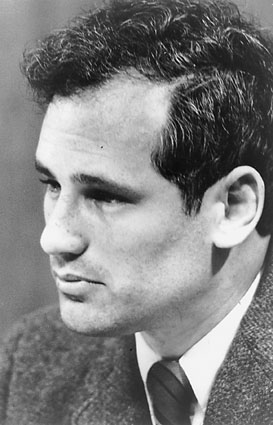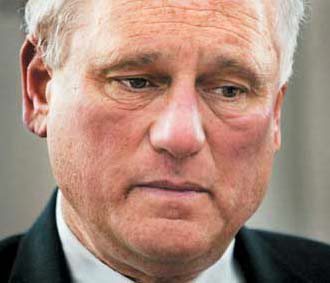No Light Rail in Vancouver!
The Neil Goldschmidt story, including the statutory rape, is important because it
shows how a Baptist became a bootlegger, and how everyone–the media, leading politicians,
business leaders–continued to pretend he was a Baptist until the revelation of the
rape came out. Only then did the media reveal to the public what a few had suspected
all along: that all the stories of Portland’s light-
As I mentioned in my Vanishing Automobile update about Goldschmidt, Portland spin
doctors are already trying to rewrite history, crediting the city’s light-

Goldschmidt, the real father of Portland’s light-
Two years later, Goldschmidt created a dilemma when he persuaded the city council
to cancel an interstate freeway in east Portland. Congress allowed cities to spend
the federal dollars from cancelled freeways on transit–but only on capital improvements,
not operating costs. This ruled out a demand-
While Goldschmidt was making these decisions, I was going to graduate school at the
University of Oregon and working for environmental groups that were trying to save
wilderness areas in Oregon’s national forests. One of those environmental groups
put on an Earth Week environmental teach-
I was a bit stunned when Goldschmidt told the audience of wilderness advocates that
he was not in favor of protecting wilderness. Instead, he thought we should make
cities more livable so that people would not need to go out into the wilderness.
He added that Portland was zoned for nearly three times its then-

In 1979, Goldschmidt became the U.S. Secretary of Transportation. Then he came home
and was elected governor in 1986. In 1990, he left office and started a political
consulting firm. He was soon arranging deals such as no-
In 1998, Portland’s Willamette Week newspaper observed that Goldschmidt once used
his influence “on behalf of the city, the state and the nation. Now he’s shaping
the civic landscape for his corporate clients.” But no one paid much heed until 2004,
when Willamette Week revealed that, when he was mayor in the 1970s, Goldschmidt started
a sexual relationship with a fourteen-

Only then did newspapers such as the Portland Tribune start reporting about the light-
I often visit cities that are contemplating rail transit and hearing stories about
how Portland’s rail lines have stimulated all kinds of development. The stories never
mention that the developments were all subsidized and, rail or no rail, would not
have been built without the subsidies. Most of these cities will not be lucky enough
to have a Goldschmidt-
1
Trackback • Posted in Transportation, Why Planning Fails
The Baptist Who Became a Bootlegger

Someone responded to my Baptists & bootleggers post by asking if I really had to mention the rape. The answer is “yes,” and not just because Wonkette started a trend of bloggers putting a sexual spin on all political news.
Reprinted from The Antiplanner